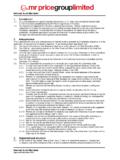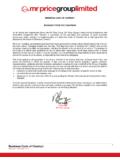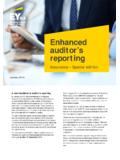Transcription of Audit and Compliance Committee Mandate - Mr …
1 Audit and Compliance Committee Mandate Approved 8 November 2016 Audit and Compliance Committee Mandate 1. Introduction The Audit and Compliance Committee (the Committee ) is constituted as a statutory Committee of the Mr Price Group Limited (the Company) in respect of its statutory duties in terms of section 94(7) of the Companies Act 71, 2008 and a Committee of the Board in respect of all other duties assigned to it by the Board. The duties and responsibilities of the members of the Committee as set out in this document are in addition to those duties and responsibilities that they have as members of the Board. The deliberations of the Committee do not reduce the individual and collective responsibilities of Board members in regard to their fiduciary duties and responsibilities, and they must continue to exercise due care and judgment in accordance with their legal obligations. These terms of reference are subject to the provisions of the Companies Act, the Company's Memorandum of Incorporation and any other applicable law or regulatory provision.
2 2. Purpose and role of the Committee The purpose of the Committee is to assist the Board of Directors with discharging its responsibility to: safeguard the assets of the Group (the Company and its subsidiary companies), operate adequate and effective systems of internal control, risk management and governance, prepare materially accurate financial reporting information and statements in Compliance with all applicable legal/regulatory requirements and accounting standards, monitor Compliance with laws and regulations and the Business Code of Conduct, and provide oversight of the external and internal Audit functions and appointments. The Committee has an independent role with accountability to both the Board and shareholders. The Committee is not an executive Committee . As such it shall not perform any management functions or assume the functions of management. The Committee shall provide a channel of communication between the Board of Directors, the internal auditors, the external auditors and other assurance providers.
3 The Committee shall assist the Board of Directors in monitoring management s system of internal controls, particularly over enterprise-wide risks as pertains to matters described in clause 3. Composition The Committee comprises at least three members to be elected by the shareholders on recommendation by the Nominations Committee . Members of the Committee must be non-executive Directors and meet all applicable independence requirements. The Board shall annually appoint a Chairman to the Committee to hold office for the period between the next two succeeding annual general meetings. The Chairman of the Committee shall be an independent, non-executive Director. The Chairman of the Board of Directors shall not be eligible to be a member of the Committee but may attend. The members of the Committee must be suitably skilled and collectively have sufficient qualifications and experience to fulfill their duties, including an understanding of the following: integrated reporting; internal financial controls; external Audit process; internal Audit process; corporate law; risk management; information technology governance as it relates to integrated reporting; and governance processes within the company.
4 The Board must fill vacancies on the Committee within 40 business days after the vacancy arises, as far as possible. 4. Statutory duties The Audit Committee must: Nominate for appointment by the shareholders an independent registered Auditor, who in the opinion of the Audit Committee is independent of the Company; Audit and Compliance Committee Mandate Approved 8 November 2016 Determine the fees to be paid and the terms of engagement of the Auditor; Ensure that the appointment of the Auditor complies with the Companies Act and other relevant legislation; Determine the nature and extent of non- Audit services which the Auditor may provide to the Company, or that the Auditor must not provide to the Company; Pre-approve any proposed contract with the Auditor for the provision of non- Audit services to the Company; Prepare a report, to be included in the annual integrated report for that financial year: Describing how the Audit Committee carried out its functions, Stating whether the Audit Committee is satisfied that the Auditor was independent of the Company, and Commenting in any way the Committee considers appropriate on the financial statements, the accounting practices and the internal financial control of the Company.
5 Receive and deal appropriately with any concerns or complaints, whether from within or outside the Company, or on its own initiative, relating to: The accounting practices and internal Audit of the Company, The content or auditing of the Company s financial statements, The internal financial controls of the Company, or Any related matter; The Committee must consider, on an annual basis, and satisfy itself of the appropriateness of the expertise and experience of the Chief Financial Officer and must confirm this by reporting to shareholders in its annual report that the Audit Committee has executed this responsibility; Make submissions to the Board on any matter concerning the Company s accounting policies, financial controls, records and reporting; and Perform any other functions determined by the Board, including the development and implementation of a policy and plan for a systematic, disciplined approach to evaluate and improve the effectiveness of risk management, control and governance processes within the Company.
6 5. Delegated duties Operational responsibility remains the responsibility of management and does not reside with the Audit and Compliance Committee . External Audit The Audit Committee shall: Meet with the External Auditor not more than a month before the Board meets to approve the financial statements in order to consider matters which appear to be of importance and relevance to the proposed financial statements and to the affairs of the Company generally; Review and approve the external annual plan and ensure that it is consistent with the scope of the engagement and that it effectively addresses the critical risk areas of the Company; Review the findings of the Audit with the External Auditor. This shall include but not be limited to: A discussion of any major issues which arose during the Audit , Any accounting and Audit judgments, and Levels of errors identified during the Audit ; Review any representation letter and managements response to the External Auditor s findings and recommendations; Review the overall Audit role, ensure that duplication across assurance providers is minimised, discuss implications of new auditing standards and ensure that the external Audit fee will sustain a proper Audit and provide value for money; Ensure that there is a process for the Audit Committee to be informed of any Reportable Irregularities (as identified in the Auditing Profession Act, 2005) identified and reported by the external auditor; Ensure that the lead engagement partner within the appointed firm is rotated every five years in accordance with current requirements.
7 Must consider and evaluate the independence of the external auditor; Review the quality and effectiveness of the external Audit process, evaluate the performance of the auditor, and, in conjunction with the Annual General Meeting, exercise final approval on the appointment or discharge of the auditors; and On a regular basis, meet separately with the external auditors to discuss any matters that the Committee or auditors believe should be discussed privately. Audit and Compliance Committee Mandate Approved 8 November 2016 Financial Statements The Audit Committee will examine and review the annual financial statements, the interim and preliminary announcements, the accompanying reports to shareholders and any other announcements regarding the Company s results or other financial/ price sensitive information to be made public, and recommend these for approval by the Board. This will be focused particularly on: The impact of significant or new financial systems; Tax and litigation matters; The appropriateness of accounting policies adopted and any changes in accounting policies and practices; Significant financial estimates based on judgment which are included in the financial statements; The impact and disclosure of significant, complex and/or unusual transactions, especially where the accounting treatment is open to different interpretations; The appropriateness of major adjustments processed at year-end; The basis on which the Company and the Group had been determined a going concern; Capital adequacy; Compliance with applicable accounting standards, JSE and legal requirements; Whether the annual financial statements present a balanced and understandable assessment of the Company s position, performance and prospects.
8 The clarity of disclosure in the company s financial reports and the context in which statements are made; Reviewing the Directors statement to be included in the annual financial statements, including the statement on effectiveness of the systems of internal control; Compliance with the financial conditions of loan covenants; Reviewing special documents such as prospectuses as and when prepared; Earnings press releases; and Review with management and the external auditors the results of the Audit , including any difficulties encountered. Integrated reporting The Committee oversees integrated reporting, and in particular the Committee must: Have regard to all factors and risks that may impact on the integrity of the integrated report, including significant judgments and reporting decisions made, monitoring or enforcement actions by a regulatory body, any evidence that brings into question previously published information, forward-looking statements or information; Comment in the annual integrated report on the financial statements, the accounting practices and the effectiveness of the internal financial controls; In conjunction with the Social ,Ethics, Transformation and Sustainability Committee , review the disclosure of sustainability issues in the integrated report to ensure that it is reliable and does not conflict with the financial information; Recommend the integrated report for approval by the Board; Consider the frequency for issuing interim results.
9 Consider whether the external auditor should perform assurance procedures on the interim results; Review the content of the summarised information for whether it provides a balanced view; Engage the external auditors to provide assurance on the summarized financial information; and Identify and monitor non-financial aspects relevant to the business of the group. Combined Assurance The Committee will ensure that a combined assurance model is applied to provide a coordinated approach to all assurance activities, and in particular the Committee should: Ensure that the combined assurance received is appropriate to address all the significant risks facing the company; Monitor the relationship between the external assurance providers and the company, and Meet privately with management to discuss areas of concern and performance of approved assurance providers. Audit and Compliance Committee Mandate Approved 8 November 2016 Internal Audit The Committee is responsible for overseeing internal Audit , and in particular, the Committee shall: In conjunction with the Board, be responsible for the appointment and/or dismissal of the Chief Audit Executive (CAE); In conjunction with the Chief Financial Officer, evaluate the performance of the CAE; and review and concur on the salary/ incentive reviews of the CAE; In conjunction with the Chief Financial Officer, review the reasonableness of the salaries/ incentives of the Internal Audit Division; Review the independence of Internal Audit , especially with respect to assurance audits conducted on the Governance and Risk Management areas within the direct control of the CAE.
10 The Committee shall consider the need for external assurance on these areas, and shall approve these audits accordingly; Review and approve the internal Audit plan, Mandate , objectives and goals, staffing and budget; Ensure that the internal Audit function is subject to a quality review, as and when the Committee determines it appropriate; Consider and review with management and the internal auditors, significant findings during the year and management s responses thereto in relation to reliable reporting, risk management, corporate governance and adequate and effective internal control; Ensure that the internal Audit function has the necessary resources and access to information to enable it to execute its terms of reference and to perform its duties in accordance with the appropriate professional standards for internal auditors; Review the co-operation and co-ordination between the internal and external Audit functions and coordinating the formal internal Audit work plan with external auditors to avoid unnecessary duplication of work; Review and, where necessary, elevate to the Board for resolution any significant differences of opinion between management and the internal Audit function; Consider and review any difficulties encountered in the course of the audits, including any restrictions on the scope of internal Audit s work or access to required information; Monitor the maintenance of proper and adequate accounting records; Monitor the overall operational and financial reporting environment; Consider any changes required in the planned scope of the internal Audit coverage; On a regular basis, meet separately with the CAE to discuss any matters that the Committee or internal Audit believes should be discussed privately.












